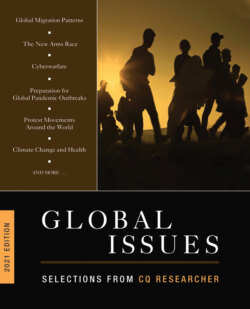Читать книгу Global Issues 2021 Edition - Группа авторов - Страница 85
Outlook Grim Future
ОглавлениеThe Ploughshares Fund’s Cirincione says the future of arms control looks grim. “It’s on life support,” he says, citing the steady erosion of treaties that once formed the pillars of the arms control architecture.
The United Nations will conduct its five-year review of the nuclear Non-Proliferation Treaty in April and May of 2020, providing a comprehensive assessment of arms control, nonproliferation efforts and progress toward disarmament. Arms control experts expect poor report cards for the United States, Russia and China regarding their commitments to nuclear disarmament.
Arms control experts predict that the review will cite the development of new hypersonic nuclear weapons, cyberwarfare capabilities and the militarization of space as troubling technological advances that will only make nuclear disarmament more difficult. The review is also expected to raise concerns over the collapse of the Intermediate Nuclear Forces Treaty, the stalemate in U.S.-North Korean negotiations, President Trump’s withdrawal from the Iran nuclear deal and the possible lapse of the New START and Open Skies treaties.
Meanwhile, the Council for a Livable World’s Bell says U.S. investments in both new missiles and missile defenses and the Pentagon’s buildup of tactical nuclear weapons are foreboding signs. “This looks like a recommitment to the concept of nuclear war fighting,” she says.
Nunn, of the Nuclear Threat Initiative, says a key factor for the future of arms control is sustained communication between the United States and Russia over maintaining strategic stability. Although Putin and Trump have agreed to hold such talks, few meetings between their military representatives have taken place. “When we’re not having a military-to-military dialogue, arms control is eroded,” Nunn says.
The American Enterprise Institute’s Maurer believes arms control will probably remain dormant for the next 10 to 30 years—the time it will take for the United States to fully modernize its nuclear weapons and delivery systems. At that point, he predicts, Russia and China will make arms control a priority because the technical superiority of America’s arsenal will leave them vulnerable.
“Once our capabilities mature, that’s when we’ll see the Russians and the Chinese become interested in arms control negotiations,” Maurer said. “We saw this during the Cold War. The Russians were always the most eager for arms control talks when we had a big military program coming down the pipeline, whether it was our missile defense system in the 1970s that resulted in the ABM Treaty, or our Pershing II and Trident missiles in the 1980s that led to the INF and START treaties.”
But Nunn fears that kind of thinking is an enormous gamble.
“We’ve gone 75 years without a nuclear explosion,” he says. “To think we’re going to go another 50 years without an awful lot of cooperation between the nuclear powers is pretty naive. We’ve become accustomed to thinking that because it hasn’t happened, it won’t happen. But that defies both the odds and history.”
